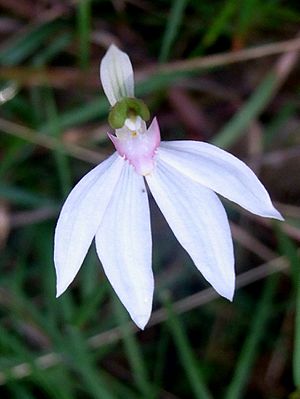Painted fingers facts for kids
Quick facts for kids Painted fingers |
|
|---|---|
 |
|
| Caladenia picta in Blue Gum Forest, Australia | |
| Scientific classification |
|
| Kingdom: | Plantae |
| Clade: | Tracheophytes |
| Clade: | Angiosperms |
| Clade: | Monocots |
| Order: | Asparagales |
| Family: | Orchidaceae |
| Subfamily: | Orchidoideae |
| Tribe: | Diurideae |
| Genus: | Caladenia |
| Species: |
C. phaeoclavia
|
| Binomial name | |
| Caladenia phaeoclavia |
|
| Script error: The function "autoWithCaption" does not exist. | |
Script error: No such module "Check for conflicting parameters".
The Caladenia picta, also known as painted fingers, is a special type of orchid. It grows only in New South Wales, Australia. This orchid has a single, slightly hairy leaf. It also has one beautiful white or pink flower. The back of the flower is usually greenish-white. Unlike many other orchids, the painted fingers orchid blooms in autumn.
Contents
What Does the Painted Fingers Orchid Look Like?
The painted fingers orchid is a plant that grows from an underground tuber. Think of a tuber like a small potato! It's a perennial plant, meaning it lives for more than two years. It's also a deciduous herb, which means its leaves might fall off at certain times.
- Leaves: Each plant has one long, thin leaf. It's about 6 to 12 centimeters (2.4 to 4.7 inches) long. The leaf is also about 2 to 3 millimeters (0.08 to 0.12 inches) wide. It has a few hairs on it.
- Flowers: A single flower grows on a stem that is about 8 to 15 centimeters (3.1 to 5.9 inches) tall. The flower itself is about 2 to 2.5 centimeters (0.79 to 0.98 inches) long. It can be 2.5 to 3 centimeters (0.98 to 1.2 inches) wide.
- Petals and Sepals: The front of the flower's petals and sepals (which look like petals) are white or pink. The back is greenish-white. They spread out like a fan.
- The top sepal stands up straight or bends slightly forward. It's about 1.5 to 2 centimeters (0.59 to 0.79 inches) long.
- The side sepals are a bit longer, about 1.8 to 2.3 centimeters (0.71 to 0.91 inches) long.
- The petals are about 1.5 to 2 centimeters (0.59 to 0.79 inches) long.
- Labellum: This is the special lip of the orchid flower. It's about 0.7 to 1 centimeter (0.28 to 0.39 inches) long. It's usually white with pink edges. The sides of the labellum curve up, and the tip curls downwards. This tip is orange-yellow and has small teeth along its edge. There are also two rows of small, club-shaped bumps in the middle of the labellum.
When Does It Bloom?
This orchid blooms from April to June. This is different from many other orchids that flower in spring or summer.
How Did the Painted Fingers Orchid Get Its Name?
This orchid was first described in 1931 by a person named William Nicholls. He first called it Caladenia alba var. picta. Later, in 1989, Mark Clements changed its status to a full species, giving it the name Caladenia picta.
The word picta in its scientific name comes from Latin. It means "painted." This is probably because of the pretty colors on its petals and labellum, making it look like it's been painted!
Where Does the Painted Fingers Orchid Grow?
The painted fingers orchid is found along the coast of New South Wales. You can find it south of the city of Newcastle. It likes to grow in eucalyptus woodlands or forests.
 | Calvin Brent |
 | Walter T. Bailey |
 | Martha Cassell Thompson |
 | Alberta Jeannette Cassell |

